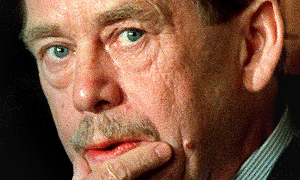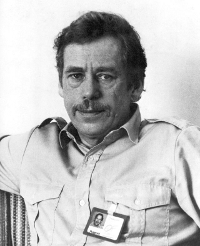
Leggi questo articolo in italiano
After various vaudeville collaborations, the first full-length play by Václav Havel was The Garden Party (1963), a sort of half-serious odyssey set in the jungle of bureaucracy. The leading character, Hugo Pludek, is a young Czechoslovakian “average man”, whose anxious parents send to a meeting with the influential Mr. Kalabis at the garden of the Liquidation Office. During a weird journey halfway between Kafka and Ionesco, Pludek won’t in fact find Mr. Kalabis, rather meeting some of the functionaries of the Office, a bunch of absurd characters who speak a non-sense language, as senseless as necessary to make oneself clear and to understand the commands of a regime of bureaucracy. End of the parable.
After a three-day mourning period announced by the government of Czech Republic to celebrate Havel’s memory, the funeral Mass was held at Saint Vitus Cathedral in Prague. Numerous messages of condolence arrived to celebrate this giant of… that’s the point. There are no categories for such people. We could say that at the Liquidation Office such a counter window was missing. It is hard to define who Václav Havel really was, such was his intellectual stature, his powerful influence, his strong political activism. For illustrative, yet incomplete purposes, it’s indeed important to make account of the deeds of such an anomalous figure: a poet, a playwright, an essayist. But also (and above all) an extraordinarily charismatic political leader, both in his home country and abroad. Some weeks ago, in a review of the latest Alvis Hermanis’ work, we drew a picture of Imants Ziedonis, to whom the play was dedicated, questioning about how a high-brow (a poet, a culture-maker) could be representative of a whole nation, stating his own urgencies and contradictions as a common sense and without turning into a demagogue. Václav Havel made it.
He went back to theatre at the end of his political career, in which he had been: the last president of Czechoslovakia and the first of Czech Republic (two mandates); a peace, human rights and ecology award-winning activist; the chairman of Human Rights Foundation International Council; a member of European Council on Tolerance and Reconciliation; a Kluge Chair for Modern Culture at the John W. Kluge Center of the United States Library of Congress; a co-founder of Forum 2000 Foundation (with its homonymous annual international conference); one of the key contributors to the dissolution of the Warsaw Pact; a great promoter of nonviolent resistance and justice (one of his first acts as President was the amnesty granted to those prisoners who had been falsely imprisoned during the Communist era). Despite some harshly criticized choices (the accession of Czech Republic to NATO, the participation in the war in Kosovo) his liberal right-wing anti-Communist government kept a wide consent among that international community which is now mourning for his death.
Before the Presidency, Havel had been among the most active leaders in the Velvet Revolution, which had peacefully led to the Communist government overthrow; Charter 77 was the title of the document drafted in January 1977 by Havel and Jan Patočka, Zdeněk Mlynář, Jiří Hájek e Pavel Kohout and signed by 247 citizens, which, under the pretext of the arrest of a local rock band, stood up for human rights. This kind of actions sent Havel in jail for several months. Activism had indeed became a necessity for whoever in Czech Republic wanted his voice to be listened after the harsh Prague Spring’s repression, which cost the almost total loss of freedom of expression, included the closedown of cinemas and theatres.
Born in the 1936 Czechoslovakia form a wealthy family of landowners and “enlightened” entrepreneurs, Havel was not accepted into any post-secondary school with a humanities program, due to the supposed collaboration of his family into the German occupation. But the attempt to the Faculty of Economics at Czech Technical University in Prague lasted less than two years; then the passion for culture and literature conquered him. While he was working as a stagehand in Prague, Havel studied drama by correspondence at the Theatre Faculty of Academy of Perfoming Arts (DAMU).
At the end of such an important life and political career, the sign of Václav Havel can be read under a total of 6 collections of poetry, 9 essays, 1 novel and 22 plays, such as The Memorandum (1965), The Increased Difficulty of Concentration (1968), Largo Desolato (1985) and Leaving (2007). The latter, his last bitter comedy which stays in the middle between Shakespeare’s King Lear and Chekhov’s The Cherry Orchard, appears 18 years after the previous play to tell the story of an old man (Vilém Rieger) torn apart by an identity crisis after losing his position of chancellor. Thus his latest work seems to reconnect the threads left untied in that Garden Party. The very essence of that Václav Havel who the international chronology will remember as an inimitable historical figure seems to be seized by two literary characters: that Hugo Pludek trying and learn a foreign (an senseless) language to enter the society and that Vilém Rieger lamenting the exclusion from that very society.
Looking at Havel’s life a peculiar sensation emerges: among the historical contradictions of a continent which is now bound to self-destroy, theater might be the only constant point, the only protected place. That “cherry orchard” which, as any other thing, had to be left behind.
Sergio Lo Gatto













Yes, Vaclav Havel was a great, righteous man. Sure he is missed in the nowaday world. We will remember you, Vaclav. The least we can is keep the memory of you alive… http://www.memmento.com/Pomnik/530/Vaclav-Havel . RIP.
Thanks a lot for reading.
And great job with your website. Keep on.
TeC